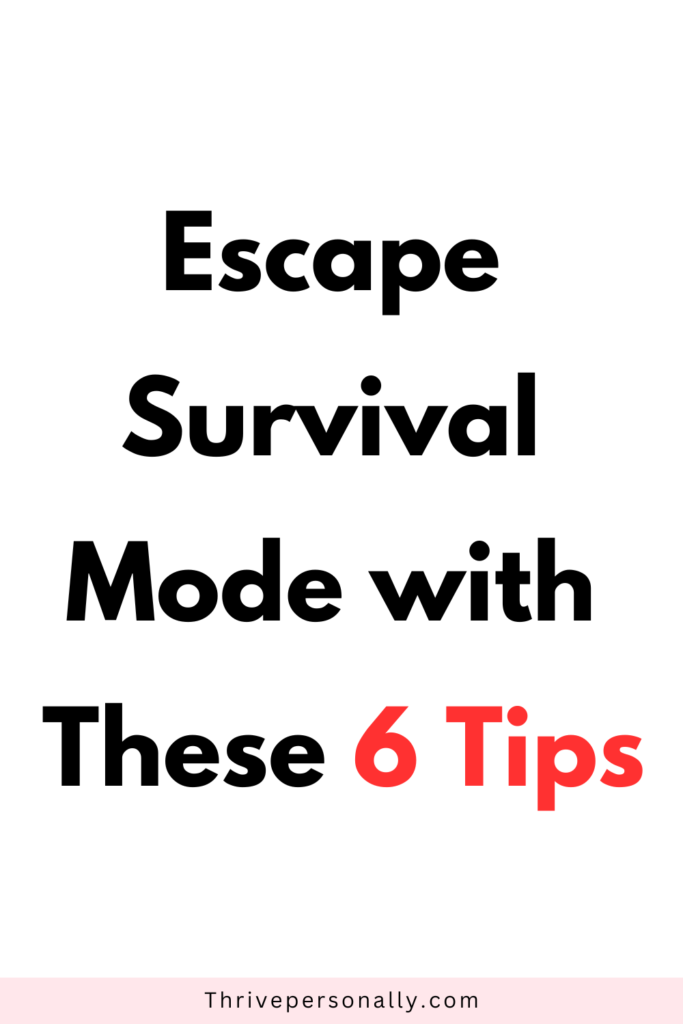When you are in survival mode, your focus shifts to the most immediate needs, such as safety and basic survival, often at the expense of your overall well-being. This state of existence can be triggered by various stressors, including financial worries, relationship problems, or health issues. You may notice that you become easily fatigued, irritable, and constantly anxious, which can hinder your ability to function effectively in daily life.
Some key signs that suggest you might be living in survival mode include difficulty concentrating, persistent feelings of sadness or hopelessness, and a lack of motivation for activities you once enjoyed. You may also find yourself feeling disconnected from friends and family, which can lead to increased isolation.
This state can cause a vicious cycle of stress, prompting you to react rather than respond thoughtfully to your circumstances. It is essential to recognize these signs because they indicate that changes are necessary for your mental and emotional health.
The Impact of Living in Survival Mode
Living in survival mode can have profound effects on both your mental and physical health. When you are constantly in a state of stress, your body reacts by releasing hormones like adrenaline and cortisol, which are essential for quick responses to immediate threats.
However, prolonged exposure to these hormones can lead to a range of health issues. You might find that stress becomes a normal part of your daily life, causing feelings of anxiousness and fear that may seem overwhelming at times. This chronic stress can create a cycle where you feel trapped, making it difficult for you to escape the confines of this survival mindset.
Moreover, living in survival mode can significantly limit your opportunities. Your focus shifts from pursuing long-term goals to merely getting through each day. As a result, you may miss out on personal growth opportunities, such as education or career advancements.
When you are in this mode, your energy is primarily directed toward meeting basic needs rather than dreaming bigger or setting long-term aspirations. It becomes much harder to concentrate when your mind is filled with fears and worries that stem from operating in a survival state.
Your health can suffer as well, leading to potential issues such as high blood pressure, fatigue, and other chronic conditions.
6 Ways to Stop Living in Survival Mode
1. Creating a Safety Net
One effective way to counter this feeling is by creating a safety net for yourself, which encompasses both financial stability and emotional support. By building this safety net, you position yourself better to face life’s challenges with confidence and security.
To start, focus on establishing a financial safety net. This means creating an emergency fund that can cover three to six months of your living expenses. Begin by evaluating your monthly costs, including rent, utilities, groceries, and transportation.
Set realistic savings goals and aim to contribute a portion of your income to this fund each month. You can utilize high-yield savings accounts to grow your savings while keeping them readily accessible. By having this financial cushion, you will feel more assured and less anxious about unforeseen expenses or job changes.
Additionally, emotional support is a crucial part of your safety net. Surround yourself with friends and family who uplift you, as social connections can be vital in navigating tough times. Engage in open conversations with loved ones about your fears and uncertainties.
2. Setting Healthy Boundaries
Setting healthy boundaries is essential for regaining control over your life and moving away from a persistent survival mode. Boundaries are guidelines that define how you want to be treated by others and clarify your limits. They allow you to manage your emotional and mental health while helping you build healthier relationships. When you establish clear boundaries, you create a structure within which you can thrive rather than merely survive.
For instance, you might need to set time limits on how much you are willing to engage in social commitments or define what topics are off-limits in discussions. Acknowledging and articulating your needs is the first step in maintaining a life less dictated by external forces and more aligned with your values.
To start with, take some time to reflect on your current situations and identify areas where you feel overwhelmed or taken advantage of. Ask yourself what makes you feel uncomfortable. Once you pinpoint these areas, communicate your boundaries clearly and assertively.
This might involve saying “no” to requests that drain your energy or explaining to others how their actions affect you emotionally. Remember, setting boundaries is not about being selfish; it is about protecting your well-being.
3. Developing a Routine
Creating a daily routine is one of the most effective ways to stop living in survival mode. When you establish a consistent routine, you can reduce stress and increase your overall sense of control. Routines provide a framework that allows you to manage your time better, prioritize your tasks, and create an environment where you can thrive rather than merely survive.
To develop a routine that works for you, start by assessing your current habits and responsibilities. Identify the times of day when you are most productive and consider scheduling your most challenging tasks during these periods.
For instance, if you find that you concentrate best in the mornings, allocate time for your essential tasks then. This makes you feel accomplished early in the day, setting a positive tone for the rest of your routine.
Read Also: How to Build a Routine, Stay Productive, and Get More Done
4. Finding Support Systems

When you find yourself in survival mode, it is crucial to recognize the importance of having a support system. These systems are designed to help you navigate challenges and regain a sense of balance in your life.
You should begin by identifying the people in your life who can provide the assistance and encouragement you need during difficult times. Friends and family often play significant roles, as they offer emotional support and a listening ear. By reaching out to them, you can share your experiences and gain their insights, which may lead to new perspectives on your situation.
In addition to personal relationships, consider exploring professional resources as part of your support system. Mental health professionals, such as therapists or counselors, can offer specialized strategies and tools to help you break free from survival mode.
They can work with you to manage stress, process emotions, and develop coping mechanisms. Engaging with support groups can also be beneficial, as they provide a platform to connect with individuals facing similar challenges. Sharing your experiences with others can create a sense of belonging and reduce feelings of isolation.
5. Practicing Self-Care
When you find yourself in survival mode, it can feel overwhelming, leaving little room for self-care. However, it is essential to recognize that prioritizing your well-being is not a selfish act; it is a vital component of mental and physical health. Taking time for yourself helps you recharge and fosters resilience, allowing you to cope better with everyday challenges.
One effective self-care practice involves scheduling regular breaks. You might start by allocating a few minutes each day to engage in activities that bring you joy, such as reading, journaling, or taking a short walk in nature. These moments can provide you with the mental space needed to step away from the stressors of life, helping to alleviate the effects of being in survival mode.
Physical self-care is also crucial in your journey away from survival mode. Engaging in regular exercise, even if it’s just a brisk walk, can significantly improve your mood and energy levels. Moreover, it is important to pay attention to your nutrition. Eating balanced meals and staying hydrated supports your body and mind, allowing you to regain vitality.
6. Setting Goals for the Future
When you find yourself in survival mode, it can be challenging to think beyond the immediate needs of daily life. However, setting achievable goals is crucial for creating a sense of hope and direction. Goals give you something to strive for, which can help you break free from the cycles of survival and allow you to focus on your future. To begin, consider what truly matters to you and what your values are. This understanding will serve as a foundation upon which to build your goals.
Start by creating short-term goals that are specific, measurable, and attainable. These could be daily or weekly objectives, such as completing a personal project or dedicating time to a hobby you enjoy. Short-term goals can provide quick wins that boost your motivation and confidence, which are essential when transitioning out of survival mode. Remember, these small achievements can pave the way for larger, long-term goals.
Once you have established your short-term goals, it’s time to think about your long-term goals. These should reflect your vision for the future and align closely with your core values. Long-term goals could involve career aspirations, personal development, or even lifestyle changes. Break these bigger goals into smaller, manageable steps to make them less overwhelming and to chart a clear path towards your ultimate objectives.
Read Also: 7 Key Areas of Your Life to Set Goals
Conclusion
Many people find themselves trapped in what is known as survival mode, a state where the focus is solely on getting by each day. This can lead to feelings of stress and exhaustion, making it difficult to envision a brighter future.
However, it is important to understand that you do not need to make drastic changes to break free from this mode of living. Instead, consider adopting a strategy of taking small, manageable steps toward improvement. By doing so, you can gradually shift your mindset and create a more fulfilling lifestyle.
Remember, transitioning out of survival mode doesn’t happen overnight; it is a gradual process. By committing to these small steps, you pave the way for a more balanced and enriching life.
Save the pin for later


